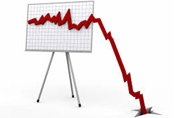Market Data

September 30, 2019
Chicago Business Barometer Has Worrisome Decline
Written by Sandy Williams
The Chicago Business Barometer dropped 3.3 points to 47.1 in September after seeing a brief rebound from contraction in August. The decline in the index released by ISM and MNI Indicators was lower than the 50+ reading expected by many economists. The September Chicago PMI, as the index is also known, marked the third contraction in four months.
“Eroding business conditions in the Chicago region mirror the nationwide trend in manufacturing. A strong dollar, a slowing global economy and the festering trade dispute between the U.S. and China have curbed demand for goods made in America,” commented MarketWatch.
The production index plunged 15.8 percent or 7.6 points to 40.4, its lowest reading since May 2009. Demand, illustrated by the new orders index, dropped back into contraction, falling 7.6 points to 48.5.
Order backlogs fell 8.9 percent to 46.8 in September and averaged 47.2 in the third quarter.
The inventory index was at a 40-month low in September, dipping 6.2 percent to 41.7
Factory gate prices declined slightly in September, but rose to an average of 57.7 for Q3. Survey participants noted that prices and business activity were affected by tariffs.
Supplier deliveries and employment were the only two components to register gains in September, advancing to 54.8 and 45.6, respectively.
Business confidence was its lowest level on a quarterly basis since the third quarter of 2009. The index fell 4.9 points for the quarter to 47.3.
Below is a graph showing the history of the Chicago Business Barometer. You will need to view the graph on our website to use its interactive features; you can do so by clicking here. If you need assistance logging in to or navigating the website, please contact us at info@SteelMarketUpdate.com.








